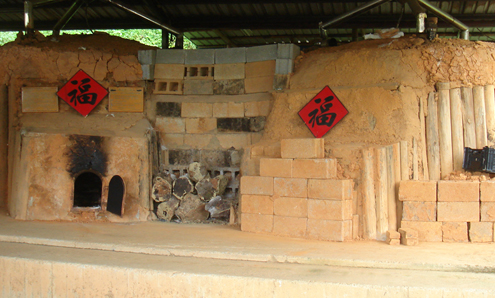
Mr. Sheng-Wu Lin, the owner of “Wuxiu Leisure Farm” has been operating a tea plantation and tealeaf business for several decades. In addition to his tea plantation in Lugu, he also owns a plot of 10 hectares in the Moso Bamboo Forest. In the context of recent government efforts to promote the revival of agricultural industries, Moso Bamboo Charcoal is produced with improved traditional kiln firing techniques under supervision of the Pingtung University of Science and Technology R&D Team, joint guidance by the Council of Agriculture, Nantou County Government, Lugu Forest Protection Association, Lugu Township Office, and the first farm resort production and marketing group of Lugu Farmers' Association. Kiln and charcoal production technologies that are constantly refined through government-industry-academia collaboration in Taiwan are adopted for the ultimate goal of providing high-quality Moso bamboo charcoal materials and related finished products. “Moso Bamboo Charcoal” represents another amazing healthy product manufactured by “Wuxiu Leisure Farm”.
Unique features
“Wuxiu Moso Bamboo Charcoal” is made from over four year old Moso Bamboo by adopting high-temperature carbonization technologies. The production process, which lasts over 10 days, employs traditional kiln technologies and meticulous manual firing techniques (instead of generic mechanical material and oil burning methods). The structure and texture of bamboo charcoal is extremely dense, weighty, and porous, with rich mineral content. Because bamboo charcoal contains porous organic materials that are completely natural, it is capable of adsorbing and decomposing harmful chemical substances such as sulfides, nitrides, methanol, benzene, and phenol. It can also regulate moisture levels and disperse strange odors and foul smells. This product is gradually adopted by hotels and restaurants in the Nantou area and applied as a natural humidity-controlling agent for wooden housing.
Bamboo charcoal possesses a large number of positive properties due to high temperature refinement. It can accelerate the blood circulation, improve body functions, and generate fresh and clean air. It is therefore known as “Black Diamond” in Japan. The cutting of Taiwanese Moso Bamboo does not harm mountains, forests, water resources, and the soil because it grows faster than Japanese bamboo. This ensures the economic efficiency of large-scale use and conforms to the spirit of water and soil conservation.
Bamboo charcoal also has air and water purification properties due to high-temperature firing. This method quickly and thoroughly extracts the moisture from the wood and causes the wood cell walls to form a porous structure. If the porous structure generated by these cell walls and cell membranes is observed under an electron microscope, it resembles millions of vertical and horizontal partitions. In addition, the moisture of the partition doors has been extracted, leaving the highly adsorptive partition walls that serve as highly efficient sponges. A tiny piece of bamboo charcoal has an air exposure surface of 200-300 m2 due to this unique structure, which is roughly equivalent to the size of a soccer field. This is truly amazing! Due to this invisible porous structure, bamboo charcoal resembles a mini air purifier or water filter, which can adsorb harmful substances in the air and water. This guarantees a purifying and deodorizing effect and repeated use without the need for electricity.
Moso bamboo charcoal produced by the Lin Family’s “Wuxiu Bamboo Charcoal Kiln” is of the highest quality. The artificial kiln is also open to the public. Guided tours explaining the charcoal manufacturing process are provided for interested visitors. The goal is to give even more local citizens the opportunity to enjoy the healthy LOHAS lifestyle brought about by bamboo charcoal.